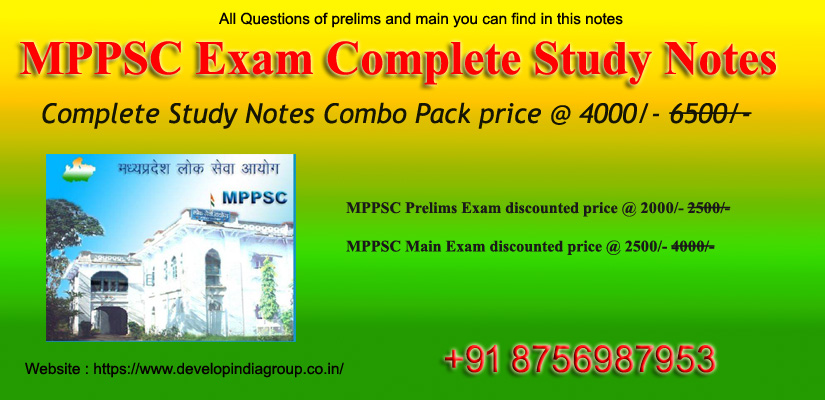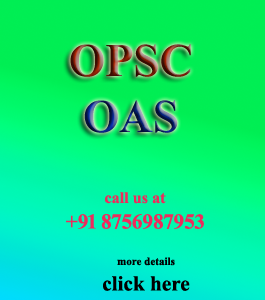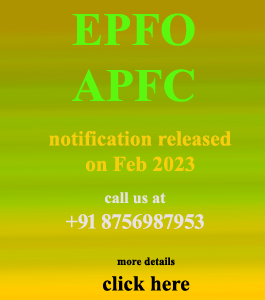MPPSC Complete Study Notes 2023
Madhya Pradesh Public Service Commission (MPPSC) has begun the registration process for the MP State Service Exam 2022. Interested candidates can apply online through the official website of MPPSC at mppsc.mp.gov.in till February 9, 2023.
Candidates will be able to make corrections to the applications from January 16, 2023, till February 11, 2023.
The MPPSC State Service Examination will be conducted on May 21 in two shits from 10 am to 12 noon and from 2: 15 pm to 4: 15 pm. The MPPSC State Service Examination admit card will be released on February 14, 2022. This recruitment drive is being conducted to fill 427 vacancies.
MPPSC State Service Examination: Know how to apply
Visit the official website at mppsc.mp.gov.in
On the homepage, click on “Apply Online”
Click on the application link against "Recruitment Advertisement For State Service Examination 2022 Dated 30/12/2022"
Combo Pack Price : Rs. 4000/- Buy Now
| Download Notification/Result | Previous year Question Paper |
| Download Syllabus | Latest Update |
Our Study Notes Prepared by : Selected competitors, retired professors, and senior competitors more than 10 year experience

 Sample-1.jpg)






 Paper I General Studies (Hindi).jpg)
 Paper II General Studies (Hindi).jpg)
 Paper III General Studies (Hindi).jpg)
 Paper IV General Studies (Hindi).jpg)
Examination Pattern and details
MPPSC द्वारा 2023 में आयोजित होने वाली परिक्षाओं की जानकारी
मध्य प्रदेश लोक सेवा आयोग ने वर्ष 2023 में आयोजित होने वाली परीक्षाओं का की जानकारी जारी कर दी है। मध्य प्रदेश लोक सेवा आयोग द्वारा वर्ष 2023-24 के लिए दो भागों में परीक्षाओं के आयोजन की जानकारी दी गई है। भाग -1 के अंतर्गत राज्य सेवा परीक्षाऐं जबकि भाग-2 के अंतर्गत अन्य भर्ती परीक्षाएं आयोजित की जाएंगी।
MPPSC MAINS EXAM 2019 DATE
राज्य सेवा मुख्य परीक्षा 2019 का आयोजन दिनांक 28 जनवरी 2023 से 2 फरवरी 2023 के बीच किया जाएगा।
जबकि राज्य वन सेवा मुख्य परीक्षा 2019 का आयोजन दिनांक 26 फरवरी 2023 को किया जाएगा।
MPPSC MAINS EXAM 2021 DATE
इसके अतिरिक्त राज्य सेवा मुख्य परीक्षा 2021 का आयोजन दिनांक 16 मार्च 2023 से दिनांक 21 मार्च 2023 के बीच किया जाएगा।
जबकि राज्य सेवा मुख्य परीक्षा 2021 का आयोजन दिनांक 16 अप्रैल 2023 को किया जाएगा।
MPPSC PRE EXAM 2022 DATE
राज्य सेवा प्रारंभिक परीक्षा 2022 एवं राज्य सेवा प्रारंभिक परीक्षा 2022 का आयोजन दिनांक 21 मई 2023 को किया जाएगा।
Selection Process/Exam Pattern
The combined competitive examination comprises two successive stages :
(1) State Services Preliminary Examination (Objective types) for selection of candidates for Main Examination.
(2) State Services Main Examination (written and interview) for selection of candidates for the various categories of services and posts.
चयन प्रक्रिया : योग्य उम्मीदवारों का चयन प्रारंभिक, मुख्य परीक्षा और इंटरव्यू में प्राप्त अकों के आधार पर किया जाएगा। प्ररंभिक परीक्षा में दो पेपर पर देने होंगे। इनमें पहला पेपर सामान्य अध्ययन और दूसरा पेपर सामान्य अभिरुचि परीक्षण का होगा। प्रत्येक पेपर के लिए अधिकतम अंक 200 निर्धारित है और इनके लिए समय सीमा दो घंटे की होगी। परीक्षा में बहुविकल्पीय प्रश्न पूछे जाएंगे। प्रत्येक पेपर में 100 प्रश्न पूछे जाएंगे और ये प्रश्न हिन्दी और अंग्रेजी दोनों में पूछे जाएंगे। प्रारंभिक परीक्षा में पास होने वाले उम्मीदवारों को मुख्य परीक्षा में बैठने का मौका मिलेगा। इसके बाद आगे की चयन प्रक्रिया के तहत उम्मीदवारों का चयन किया जाएगा।
Examination Timing
Timings for First Question Paper : From 10:00 AM to 12:00 PM
Timings for Second Question Paper : From 02:15 PM to 04:15 PM
MPPSC Preliminary Exam (CSAT based Syllabus)
The syllabus for Preliminary examination is given below :
FIRST PAPER: GENERAL STUDIES
1. General Science and Environment
Questions on general science and Environment (Environmental Ecology, Biodiversity & Climate Change) will cover general appreciation and understanding of science including matters of every day observation and experience as may be expected of a well educated person who has not made a special study of any particular scientific discipline.
2. Current Events of National & International Importance
In current events knowledge of significant National and International level will be tested.
3. History of India and Independent India
In History, questions of general knowledge related to social, economic and political aspects will be asked. Also, there will be questions on Indian National Movement and Development of Independent India.
4. (a) Geography of India
There will be questions of general knowledge relating to Physical, social and economic geography. It will also include questions on Indian Agriculture and Natural resources. There will be questions pertaining to demography and census of India.
(b) General Geographical awareness of world.
5. Indian Polity and Economy
Political system and constitution of the country, Panchayati Raj, social system, sustainable economic development, elections, political parties, plans, industrial development, foreign trade and economic and financial institutions.
6. Sports
Important games and sports tournaments, Awards, personalities and Renowned Sports Institutions of M.P., India, Asia and World.
7. Geography, History and Culture of M.P.
There will be questions related to the development of Mountains, rivers, climate, Flora and Fauna, Minerals transportation in the Geography of Madhya Pradesh . It will also have questions relating to important dynasties of M.P., Contribution of important dynasties in the Histroy & Culture of Madhya Pradesh, There will be questions on Tribals, Arts, Architecture, Fine Arts and Historical personalities of M.P.
8. Polity and Economy of M.P.
Political system, Political parties and elections, Pachyati Raj, Social system and sustainable economic development of M.P.. This will also include questions on Industry, Plans, Economic programmes, business, demography and census of M.P.
9. Information and Communication Technology
Questions pertaining to characteristics, uses, and terminologies such as website, online, search engine, e-mail, video mail, chatting, video conferencing, hacking, cracking, virus and cyber crime.
10. Scheduled Caste & Scheduled Tribe (Prevention of Atrocities) 1989 (No.33 of 1989) and the Protection of Civil Rights Act, 1955 (No. 22 of 1955)
11. The Protection of Human Rights Act, 1993.
SECOND PAPER : GENERAL APTITUDE TEST
1. Comprehension
2. Interpersonal skill including communication skill
3. Logical reasoning and analytical ability
4. Decision making and problem solving
5. General mental ability
6. Basic numeracy (numbers and their relations, order of magnitude etc.-Class X level) Data interpretation (charts, graphs, tables, data sufficiency etc.-Class X level)
7. Hindi Language Comprehension Skill (Class X level)
Note: - Question relating to Hindi Language Comprehension skill of Class X level will be tested through passages from Hindi language only without providing English Translation thereof in the question paper.
MPPSC Main Exam (Revised Syllabus)
There will be six question paper in this exam.
| Sr. No. | Paper | Topic | Marks | Time Duration |
| 1. | Paper-I | General Studies-I | 300 | 03:00 Hours |
| 2. | Paper-II | General Studies-II | 300 | 03:00 Hours |
| 3. | Paper-III | General Studies-III | 300 | 03:00 Hours |
| 4. | Paper-IV | General Studies-IV | 200 | 03:00 Hours |
| 5. | Paper-V | General Hindi | 200 | 02:00 Hours |
| 6. | Paper-VI | Essay & Unseen Passage | 100 | 02:00 Hours |
| TOTAL | 1400 |
The following table illustrates the detailed syllabus of Madhya Pradesh Civil Services revised Main Exam.
| Paper I (General Studies I) | |
|---|---|
| Subject | Topic |
| History & Culture | World History |
| Renaissance | |
| Revolution of England | |
| French Revolution | |
| Russian Revolution | |
| World War I and II | |
| Indian History | Political, Economical and Social history of India from Harappa civilization to 10th Century AD |
| Moguls and their administration, emergence of composite culture, Political, Economical and Social history of Central India from 11th to 18th Century AD | |
| Impact of British Rule on Indian economy and society, Indian response to British Rule: Peasant and Tribal revolts, The First Struggle of Independence | |
| Indian Renaissance: The Freedom, National Movement and its leaders (with special reference to MP) | |
| Emergence of India as a Republic, Reorganization of States, Formation of MP | |
| Major events of the post-independence period | |
| Indian Culture, Heritage with special reference to MP: Salient aspects of Art Forms, Literature, Festivals & Architecture from ancient to modern times | |
| World Heritage sites in India, Tourism in Madhya Pradesh | |
| Geography | Salient features of physical geography of India and World |
| Distribution of key natural resources, Agro-climatic zones and Industries in MP | |
| Demography of India and MP, Tribes of Madhya Pradesh with particular reference to vulnerable tribes | |
| Agro ecology and its relevance to man, sustainable management and conservation | |
| Major crops of the state, holdings and cropping patterns, physical and social environment of crop distribution and pattern. | |
| Issues and challenges related with quality and supply of seed, manure, farming, practices, horticulture, poultry, dairy, fisheries and animal husbandry, etc. | |
| Agriculture produce, transport, storage and marketing in the state | |
| Physical, Chemical, and Biological properties of Soil | |
| Soil process and factors of soil formation | |
| Mineral and organic constituents of soil and their role in maintaining soil productivity | |
| Essential plant nutrients and other beneficial elements in soils and plants | |
| Problem soils and their reclamation methods | |
| Problems of soil erosion and soil degradation in Madhya Pradesh. | |
| Soil conservation planning on watershed basis | |
| Food processing and related industries in India – scope and significance, location, upstream and downstream requirements, supply chain management | |
| Land reforms in India | |
| Water Management | Ground water and Watershed management |
| Water usage and efficient irrigation systems | |
| Drinking water: supply, factors of impurity of water and quality management | |
| Disaster and its Management | Man-made and Natural disasters: Concept and scope of disaster management |
| Specific Hazards and mitigation | |
| Community planning: Resource Mapping; Relief & Rehabilitation, Preventive and Administrative measures, safe construction, Alternative communication and survival skills | |
| Disaster Case Studies | Chernobyl Atomic Plant Tragedy 1986 |
| Bhopal Gas Tragedy 1984 | |
| Kutch Earthquake 2001 | |
| Indian Tsunami 2004 | |
| Fukushima Daiichi Japan Nuclear Disaster 2011 | |
| Uttarakhand Flesh Flood 2013 | |
| Ujjain Tragedy 1994 | |
| Allahabad Kumbh Stampede 2013 | |
| J & K Flood 2014 | |
| Paper II (General Studies II) | |
| The Constitution, the Political & Administrative Structure of Governance | Constitution drafting committee; the Constitution of India; the Preamble, Basic Structure, Fundamental Rights and Duties and Directive Principles of State Policy; Schedules of the Constitution, Constitutional Amendments |
| Comparison of the Indian Constitution with that of other countries | |
| Center and State Legislature | |
| Center and State Executive | |
| Judiciary – Supreme Court, High Court, District and Subordinate Courts; Contempt of Court | |
| Nature of the Indian Union, Center-State Relations, Division of Power (Center List, State List and Concurrent List). Distribution of resources | |
| Decentralization and people’s participation in Democratic Governance | |
| Local Self Government | |
| 73rd and 74th Amendment of Constitution | |
| The Panchayats and the Municipalities (Rural and Urban Local Governance) | |
| Lokpal, Lokayukt and Lok Nyayalaya | |
| Judiciary as a watch-dog protecting the Constitutional Order – Judicial Activism and Public Interest Litigation | |
| Accountability and Rights: Competition Commission, consumer Courts, Information Commissions, Women Commission, Human Rights Commissions, SC/ST/OBC Commissions, Other redressed agencies/authorities | |
| Transparency and Accountability, Right to Information, Right to Services, Utilization of public funds | |
| Democracy at work, Political Parties, Political Representation, Citizens Participation in Decision Making | |
| Elections: Election Commission, Electoral reforms | |
| Emergence of Community Based Organizations (CBOs) and Non-Government organizations (NGOs); Self Help Group | |
| Issues and role of media (Electronic, Print and Social) | |
| Security Issues | External and Internal |
| Social & Some Important Legislation | Indian society, Social Legislation as an instrument of Social Change |
| The Protection of Human Rights Act, 1993 | |
| Protection to Women & Criminal Law (Under Indian Constitution Law & Criminal Procedure Code) | |
| Protection of Women from Domestic Violence Act, 2005 | |
| The Protection of Civil Rights Act, 1955 | |
| The Scheduled Castes and the Scheduled Tribes (Prevention of Atrocities) Act, 1989 | |
| Right to Information Act, 2005 | |
| Environment (Protection) Act, 2005 | |
| The Consumer Protection Act, 1986 | |
| The Information Technology Act, 2000 | |
| The Prevention of Corruption Act, 1988 | |
| The Madhya Pradesh Lok Sewaon ke Pradan Ki Guarantee Adhiniyam - 2010 | |
| Social Sector – Health, Education & Empowerment | Health services, Preventive and curative health programs in India/MP with an emphasis on children and women’s health |
| Issues related to availability of curative health to all | |
| Availability of doctor & Paramedical staff | |
| Health services in rural India | |
| Malnutrition, its causes and effects and Govt. programs for supplementary Nutrition | |
| The technological interventions in the field of Immunology, Immunization, Family health, Biotechnology, Communicable and non-communicable diseases and remedies | |
| Vital statistics | |
| WHO – Objectives, Structures, functions and its programs | |
| Education System | Education as a tool of HR development |
| Universal elementary education | |
| Quality of Higher and Technical | |
| Vocational Education | |
| Issues related to girls’ education | |
| Under privileged classes and differently abled classes | |
| Human Resource Development | Availability of skilled manpower |
| Employability and productivity of human resource of India | |
| Trends of employment | |
| Role of Institutions like NCHER, NCERT, NIEPA, UGC | |
| Open Universities, AICTE, NCTE, NCVT, ICAR, IITs, NLUs, IIMs, Polytechnic and it is, etc. | |
| The human resource development | |
| Welfare Program | Welfare programs Issues related to – Aged people, Differently able people, Children Women, Labor, Socially deprived Classes and Displaced groups of developmental projects |
| Public Services | Public Services |
| All India Services | |
| Central Services | |
| State Services | |
| Constitutional Positions | |
| Role and function | |
| Nature of function | |
| Union Public Service Commission | |
| MP State Public Service Commission | |
| Training and Training Institutions of State and Center in context of changing governance pattern | |
| Public Expenditure and Accounts | Control over public Expenditure |
| Parliamentary control | |
| Estimate Committee | |
| Public Accounts committee, etc. | |
| Office of the Comptroller and Auditor General of India | |
| Role of Finance Ministry in Monetary and Fiscal Policy | |
| Composition and function of Accountant General of MP | |
| International Organization | UN and its associate organizations |
| IMF, the World Bank and Asian Development Bank | |
| SAARC, BRICS, other Bilateral and Regional groupings | |
| WTO and its impact on India | |
| Paper III (General Studies III) | |
| Science & Technology | |
| Chemistry | Matter in our surroundings |
| Elements | |
| Compounds | |
| Mixtures | |
| Metals and Non-Metals | |
| Carbon and its Compounds | |
| Molecules | |
| Atoms | |
| Structure of Atom | |
| Chemical reactions | |
| Acids, Bases and Salts | |
| Biology | Organism |
| Types of organisms | |
| Tissues | |
| Fundamental unit of life-Cell | |
| Life Process | |
| Metabolism | |
| Control and Coordination | |
| Reproduction | |
| Heredity and Evolution | |
| Physics | Gravitation |
| Motions | |
| Force | |
| Laws of Motion | |
| Work and Energy | |
| Light | |
| Sound | |
| Electricity | |
| Magnetism | |
| Reasoning & Data Interpretation | Basic numeracy and Statistics (numbers and their relations) |
| Probability | |
| Data handling and Interpretation (Charts, Graphs, Tables, Data sufficiency, etc.) | |
| Ratio and Proportion, Unitary method, Profit and Loss Percentage, Discount, Simple and Compound Interest | |
| Mensuration: Area, Perimeter, Volume | |
| Logical reasoning, Analytical ability & Problem solving | |
| Technology | Applications of Science and Technology in Social and Economic development |
| Indigenous Technology | |
| Transfer of technology and developing new Technologies | |
| Patents and Intellectual Property Rights (TRIPS & TRIMS) | |
| Contribution of Indians in the field of Science and Technology | |
| Emerging Technology | Emerging technologies like Information and Communication Technology |
| Remote sensing, Space, GIS, GPS | |
| Biotechnology & Nano-technology: their application in the field of Agriculture and Allied sectors | |
| E-Governance | |
| Transport | |
| Spatial Planning | |
| Housing | |
| Energy | Conventional and Non-Conventional sources of energy |
| Energy management: Issues and Challenges | |
| Current status of alternative sources of energy and their future prospects | |
| Environment and Sustainable Development | Environmental degradation: its causes, effects and remedies |
| Environmental protection laws, policies and regulatory framework | |
| The environment – development debate | |
| Solid, Effluent, Sewer, Medical, Hazardous, and E-waste management | |
| Climate Change: causes and Remedial measures | |
| Ecological Prints and Coping strategies | |
| Indian Economy | Development Experience of India |
| Causes of low Industrialization in MP | |
| Economic reforms since 1991: Industrial and Financial sector reforms, stock market and banking systems | |
| Liberalization, Privatization and Globalization | |
| Current trends and challenges in the India Economy | |
| Development planning in India | |
| National Income and Accounting System | |
| Infrastructural development and issues | |
| Poverty, Unemployment, Regional Imbalances and Migration | |
| Urban issues, Urban development (social and economic infrastructure) and Rural Credit | |
| Indicator of development | |
| Human development and Economic development | |
| Co-operative movement in India and MP | |
| Importance of agriculture in MP and Indian Economy | |
| Factors of economic development | |
| Issues of Direct and Indirect Subsidy for farm sector and other social sectors | |
| Public Distribution System: Objective, Functioning, Limitation, Issues of Buffer Stock and Food Security | |
| Paper IV (General Studies IV) | |
| Human needs and Motivation | Ethics and Values in Public Administration |
| Ethical elements in governance – integrity, accountability and transparency | |
| Ethical reasoning and moral dilemmas | |
| Conscience as sources of ethical guidance | |
| Code of conduct for civil servants and values in governance | |
| Philosophers/Thinkers, Social workers/Reformers | Mahavir |
| Buddha | |
| Kautilya | |
| Plato | |
| Aristotle | |
| Gurunanak | |
| Kabir | |
| Tulsidas | |
| Ravindra Nath Tagore | |
| Raja Ram Mohan Roy | |
| Swami Dayanand Saraswati | |
| Swami Vivekanand | |
| Sri Aurobindo | |
| Mohandas karamchand Gandhi | |
| Sarvpalli Radhakrishnan | |
| Bhimrao Ramji Ambedkar | |
| Maulana Abul Kalam Azad | |
| Deen Dayal Uppadhyaya | |
| Ram Manohar Lohiya | |
| Attitude | Content, Elements, Function Formation of Attitude |
| Attitudinal change | |
| Persuasive Communication | |
| Prejudice and discrimination | |
| Stereotypes in Indian context | |
| Aptitude | Aptitude and foundational values for Civil Service, integrity, impartiality and non-partisanship, objectivity, dedication to public service, empathy, tolerance and compassion towards the weaker-sections |
| Emotional Intelligence | Emotional intelligence-concepts, their utilities and application in Administration and Governance |
| Corruption | Types and causes of corruption |
| Effects of corruption | |
| Approaches to minimizing corruption – Role of society, media, family, whistleblower | |
| UN Convention on Corruption | |
| Measuring corruption | |
| Transparency International etc. | |
| Case Studies | Based on the contents on the syllabus |
| Paper V (Hindi) | |
| Hindi Language | Grammar |
| Comprehension | |
| Administrative Vocabulary | |
| Hindi to English and English to Hindi Translation | |
| Paper VI (Essay) | |
| Essay | Essay 1 |
| Essay 2 | |
| Essay 3 | |
Dear Aspirants, If you want comprehensive curriculum based study materials, then "Develop India Group" will meet your all needs in a single place. We will also provide guidance for strategic preparation for the success in competitive exams. We have prepared the study materials by the analyzing the pattern of the last five years papers. So that we included all important issues in the preparing of the study materials. After analyzing the success of the past few years, we can say that "Develop India Group" is a top-tier institution, where 75-85 percent of questions are being asked by our study material. This is a major breakthrough for us and you can take edge over other competitors by the studying of "Develop India Group" study notes.
यदि आप व्यापक पाठ्यक्रम आधारित सम्पूर्ण अध्ययन सामाग्री चाहते हैं, तो डेवलप इंडिया ग्रुप एक ही स्थान पर आपकी आवश्यकताओं को पूरा करेगा। हम आपको प्रतियोगी परीक्षा में सफलता के लिए रणनीतिक तैयारी हेतु मार्गदर्शन भी प्रदान करेंगे। हम पिछले पांच वर्षों के प्रश्नपत्रों के पैटर्न का विश्लेषण करके पूरी अध्ययन सामाग्री को तैयार करते हैं। ताकि अध्ययन सामाग्री के निर्माण में हम सभी महत्त्वपूर्ण मुद्दों को शामिल कर सकें। पिछले कुछ साल की सफलता के विश्लेषण करने के बाद, हम यह कह सकते हैं कि डेवलप इंडिया ग्रुप एक शीर्ष स्तरीय संस्थान है, जहां 75-85 प्रतिशत सवाल हमारी अध्ययन सामाग्री से पूछे जा रहे हैं। यह हमारे लिए बड़ी सफलता है और आप डेवलप इंडिया ग्रुप की व्यापक अध्ययन सामाग्री का अध्ययन कर के अन्य प्रतियोगियों पर बढ़त हासिल सकते हैं।
-
Develop India Group (DIG) is India’s largest complete study materials provider website.
(डेवेलप इंडिया ग्रुप (DIG) भारत की सबसे बड़ी अध्ययन सामग्री प्रदाता वेबसाइट है।)
-
Develop India Group (DIG) prepared their study materials in the guidance of highly qualified and experience mentoring specialist.
(डेवेलप इंडिया ग्रुप (DIG) ने सुयोग्य और अनुभवी सलाह विशेषज्ञों के मार्गदर्शन में अपनी अध्ययन सामग्री तैयार की है।)
-
Develop India Group (DIG) study materials have been prepared strictly according to revised syllabus.
(डेवेलप इंडिया ग्रुप (DIG) अध्ययन सामग्री पूर्णतया संशोधित पाठ्यक्रम के अनुसार तैयार की गई है।)
-
Only aim behind preparing these study materials is to provide study material to those students, who are unable to attend coaching classes in mega cities.
(इन अध्ययन सामग्रियों को तैयार करने का उद्देश्य केवल उन छात्रों कोअध्ययन सामग्री प्रदान करना है, जो महानगरों में कोचिंग क्लासेस में भाग लेने में असमर्थ हैं।)
-
All kind of facts & data in this material have been collected from authentic sources.
(इस सामग्री में सभी प्रकार के तथ्यों और डेटा को प्रामाणिक स्रोतों से एकत्र किया गया है।)
-
All kind of data is updated in quarterly in our study notes.
(हमारी अध्ययन सामग्रियों में सभी प्रकार के आंकङों को तिमाही में अपडेट किया जाता है।)
-
Develop India Group (DIG) study materials have been prepared in simple language so that student can memorize easily and better understand.
(डेवेलप इंडिया ग्रुप (DIG) अध्ययन सामग्री सरल भाषा में तैयार की गई है ताकि छात्र आसानी से और बेहतर ढंग से समझ सके।)
- Complete syllabus of preliminary and main exam has been covered in this study material.
(प्रारंभिक और मुख्य परीक्षा का पूरा पाठ्यक्रम इस अध्ययन सामग्री में शामिल किया गया है।)
-
All important and relevant points have been highlighted in bold, underline and italic ways.
(बोल्ड, रेखांकन और इटैलिक तरीके से सभी महत्वपूर्ण और प्रासंगिक बिंदुओं को हाइलाइट किया गया है।)
-
We have prepared our study materials with trained, talented, experienced team for each subject. They are supported by subject experts.
(हमने प्रत्येक विषय के लिए प्रशिक्षित, प्रतिभाशाली, अनुभवी टीम के साथ और विषय विशेषज्ञों के मार्गदर्शन में अध्ययन सामग्री तैयार की है।)
-
Once you will read these study materials, you will surely find 70 to 80 % questions in next coming examination.
(एक बार जब आप ये अध्ययन सामग्री पढ़ लेंगे, तो आपको निश्चित रूप से आने वाली परीक्षा में 70 से 80% प्रश्न मिलेंगें।)
- So BUY TODAY and secure your future.
(इसलिए आज ही खरीदें और अपना भविष्य सुरक्षित करें.)











.jpg)